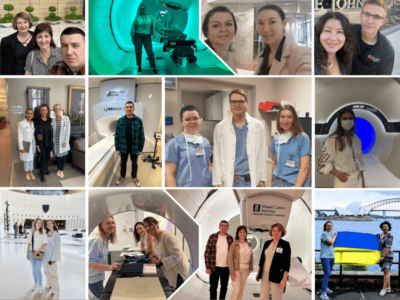The full-scale Russian invasion of Ukraine has devastated the Ukrainian healthcare infrastructure, disrupting cancer care, halting clinical trials, and compounding long-standing systemic challenges. Even before the war, Ukraine’s oncology system faced major constraints: Limited access to radiotherapy equipment, outdated chemotherapy supply chains, and workforce shortages. The invasion intensified these issues—cancer hospitals were damaged, warehouses destroyed,... […]
What did President Richard M. Nixon and Senator Edward M. Kennedy have in common? They each played a pivotal role in the passage of the National Cancer Act signed by Nixon on Dec. 23, 1971. The NCA established the National Cancer Program authorizing the initial investment in the NCI-designated Cancer Centers Program.
Last November, the American public voted on America First causes, which include the greatest scientific discovery and achievement enterprise in the world: The National Institutes of Health. NIH has made America first in biomedical science for the past century.
For those who have spent their entire careers in oncology, cancer is our world. We see it as something to be studied, understood, controlled, cured, or prevented.
The cancer center program of the NCI is a success that is admired not only within the NIH but worldwide. This is due, in large part, to the cancer center review process that has evolved and strengthened over the years.
I did not find the process of being suddenly without employment as refreshing as one might think. It did, however, provide a forced opportunity to engage in self-reflection, to critically analyze the situation around cancer, and to face the complex set of problems that cancer, and society, present to us.
The American Cancer Society’s recent report on the increasing incidence rates of colorectal cancer in young adults once again rang an alarm bell for adults over 45 to get checked, especially if they are having symptoms. But as an oncologist with more than 40 years of experience, I also believe that this should be a clarion call to scientists and researchers, and for regulators at the FDA.
A diagnosis of cancer brings with it fear and uncertainty. Changes proposed by the Trump administration pose a grave new risk to those who suffer from cancer today or will suffer from cancer in the future. A future which was increasingly optimistic is suddenly far more threatening.
When I started this column, I was wanting to retain the sense of connection that I had to the greater cancer community as I stepped away into a period of disconnection.
Just consider for a minute if this was the first year of running your lab, if you were on the job market as a physician or scientist right now, if you were a resident contemplating a career in cancer research after fellowship, if you were a graduate student or postdoc, if you were an undergraduate or a technician who was looking toward graduate school.















